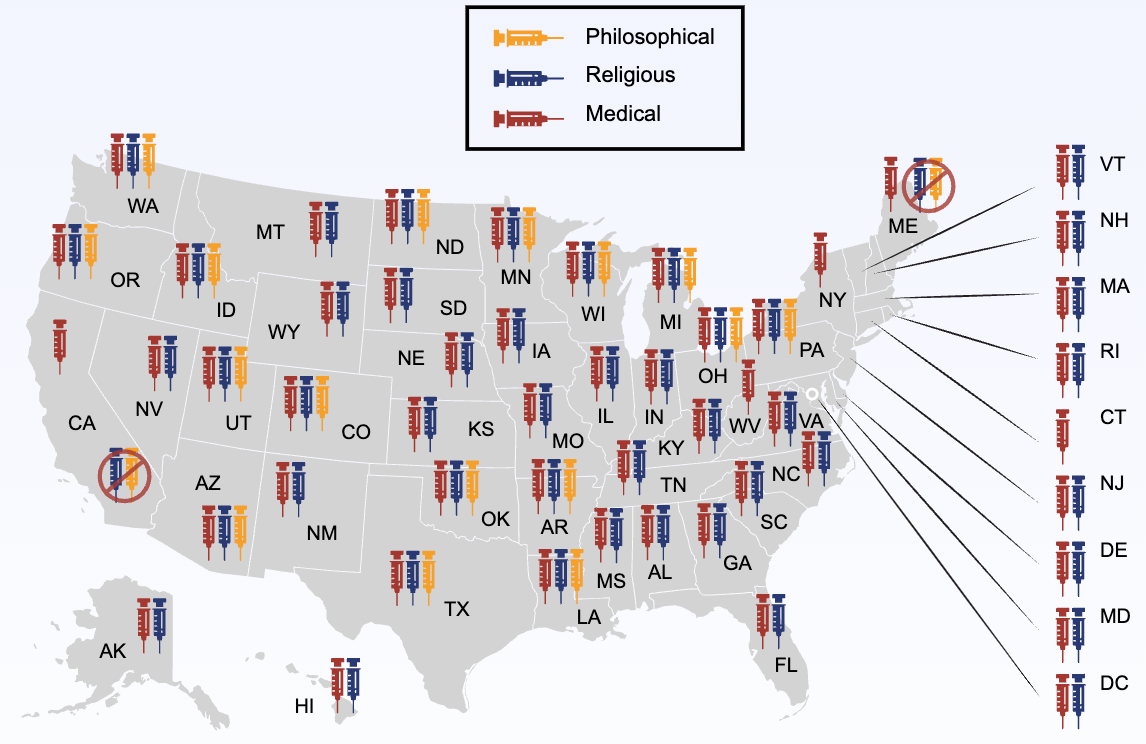What You Need To Know About School Vaccine Religious Exemptions
Getting your child a vaccine religious exemption doesn't have to be complicated.
As a new school year begins, the mainstream media is putting parents on notice that their children need to be vaccinated to attend or remain in school. Meanwhile, the government is sinking millions of dollars into back-to-school vaccination campaigns as measles headlines create fear and prop up vaccination as the supposed solution to a benign childhood illness that hasn’t seen triple digits since the 1990s.
Unless you live in states like Tennessee, Montana, or Iowa that have passed or are considering legislation to require schools to include information about exemptions in their communications to parents about “immunizations,” you've probably received a letter from the school that left you with the idea that your child could be excluded unless you sign on to the Centers for Disease Control and Prevention’s (CDC) untested vaccination schedule.
The CDC has an active back-to-school vaccination campaign complete with promotional materials, such as graphics, print resources, and social media posts (ironically targeting measles) to increase vaccination rates—and “provides resources” for schools to use to remind parents of the vaccination requirements for school entry without information about vaccine exemptions.
If parents didn’t know better, they might think they have no other option but to acquiesce to an out-of-control pediatric vaccination schedule. Yet unless you live in one of five states that value pharmaceutical companies over parental rights, you have options—and filing a vaccine exemption is one of them.
While hiring an attorney is an option, filing your own vaccine exemption is straightforward and something you can easily do yourself with a little help.
Find Out Which Vaccine Exemptions Are Allowed in Your State
The first step in filing a vaccine exemption is to determine which exemptions are allowed in your state. All 50 states offer medical vaccine exemptions, although some have made it equally difficult to obtain them. Religious exemptions are allowed in all states except for New York, West Virginia, Maine, Vermont, Connecticut, and California, and roughly 16 states offer philosophical vaccine exemptions.
For a detailed overview of the exemptions available in each state, refer to this visual by the National Vaccine Information Center (NVIC):
There are three types of vaccine exemptions. A philosophical vaccine exemption, also known as a personal belief exemption, allows individuals to opt out of vaccine requirements based on their personal, moral, or ethical beliefs. This type of exemption is generally the easiest to obtain, as it does not require adherence to any specific religious doctrine. Instead, it is based solely on personal convictions, such as ethical considerations, individual rights, or a general opposition to vaccines.
A medical vaccine exemption is granted when an individual has a specific medical condition or contraindication that makes receiving a vaccine unsafe for their health. These exemptions are based on guidelines from medical authorities and require documentation from a healthcare provider.
A religious vaccine exemption permits individuals to forgo vaccines due to sincerely held religious beliefs. Unlike philosophical exemptions, religious exemptions are grounded in specific religious doctrines or personal interpretations of religious teachings that oppose vaccination.
States that allow religious exemptions typically require a written statement or affidavit explaining the religious objections. In some cases, a signature from a spiritual leader may be necessary. In other states, parents may be required to have their religious exemption form signed by a health care provider.
Ask Your Child’s School For Their Exemption Policy
Once you’ve confirmed that your state offers religious exemptions, ask the school if they have a policy or handbook with their immunization requirements. If your school or state requires a vaccine exemption form, make sure it simply acknowledges your right to request a religious exemption or recites the state’s law for exemption requests. A form should never require a parent to admit to being negligent for not vaccinating their child.
Public schools are generally required to comply with state laws, including those that mandate the allowance of religious vaccine exemptions. This means your child cannot be deprived of their right to a free education for not being vaccinated. Therefore, it's crucial to know your state’s laws and include the legal authority in any exemption you file.
With public schools, the challenge often lies not in filing the exemption but in navigating the school's process for evaluating exemption requests. Schools may require documentation, a formal statement of your religious beliefs, or implement a review process that complicates obtaining the exemption.
Whether private schools must allow religious exemptions varies by state and institution. Some states have legislated that their vaccine exemptions apply across the board to public and private schools, preschools, and institutes of higher learning. Other states use the term “school” more broadly.
Use NVIC’s website or do a simple internet search to check your state’s law. If it is unclear, ask the private school your child attends what their process is for submitting exemptions.
Include Legal Authority In Your Exemption Request
If you live in a state that offers religious exemptions, you may need to provide an explanation with your request. If there is no required format, start by citing the relevant legal authority that grants you the right to object to the school’s vaccination requirements. This approach notifies the school that you are exercising a legal right provided by the state, making them less likely to challenge your request.
Here’s an example of what this might look like for an Illinois resident:
“Title 77 of the Illinois Administrative Code, Chapter 1, Subchapter i, Part 665, Section 665.510 gives me the legal right as a parent to object to my child’s immunizations on religious grounds and applies to any public, private or parochial school or a preschool program operated by an elementary or secondary school or institution of higher learning.”
Here’s an example of what this might look like for a Michigan resident:
“According to the Michigan Compiled Laws Section 333.9215, a child is exempt from vaccination requirements if a guardian, or person in loco parentis of the child “presents a written statement to the administrator of the child's school or operator of the group program to the effect” that the vaccination requirements cannot be met because of “religious convictions or other objection to immunization.”
Here’s another example of what this might look like for a North Carolina resident:
According to G.S. 130A-157, if the “bona fide religious beliefs of an adult or the parent, guardian or person in loco parentis of a child are contrary to the immunization requirements [...], the adult or the child shall be exempt from the requirements. Upon submission of a written statement of the bona fide religious beliefs and opposition to the immunization requirements, the person may attend the college, university, school, or facility without presenting a certificate of immunization.”
More simply worded, one could say, “G.S. 130A-157 gives me the right to object to immunization requirements if they conflict with my bona fide religious beliefs.”
After establishing your authority and right to request the exemption, move on to your explanation or argument.
Center Your Request Around Sincerely Held Religious Beliefs
A common mistake when writing a religious exemption is focusing on arguments unrelated to religion. Under no circumstances should your religious exemption be centered around a vaccine-injury story, safety studies, vaccine adverse events, bodily autonomy, vaccine ingredients, or moral and ethical issues.
It is well known that during the COVID-19 pandemic, federal employers especially and schools were encouraged to use religious exemption forms with a series of questions designed to trip up a requester so that their argument would center around moral or ethical arguments that would give the institution grounds for denial.
Some states explicitly note that general philosophical or moral reluctance to allow “immunizations” does not provide a sufficient basis for an exemption to vaccination requirements.
Your exemption request should entirely focus on your sincerely held religious beliefs, or there’s a high likelihood it will be denied. In other words, you must make a faith-based argument.
At the same time, avoid making denominational arguments that could weaken your case. For instance, don’t attempt to argue that a particular denomination does not support vaccinations and base your sincerely held beliefs on that denomination. Chances are, there is authority showing that at least in some cases, it does support vaccinations.
Over the years, vaccine enthusiasts have worked very hard to get the endorsements of large denominations—and then when someone identifies as that particular denomination, the reviewer denies the exemption citing some sort of statement showing that the denomination that person identifies as supports vaccination.
However, a religious objection doesn’t have to be directed by the tenets of an established religious organization. In other words, denomination is irrelevant unless you make it relevant. You have the right to a religious exemption and it should be based on your personal, subjective religious convictions, not the official stance of any religious organization.
Know Your Rights
If your religious exemption is denied, ask for an explanation and review your own request. Check if you blended moral and religious arguments or mistakenly mentioned the Civil Rights Act, which applies to workplace exemptions. If needed, amend your request and resubmit it. There are no limits on how many times you can submit an exemption request.
If your exemption should not have been denied, you can ask for an appeal or request reconsideration. If you’re still having trouble getting an exemption, consider seeking legal counsel.
One common reason for rejection is a partially vaccinated child, which is used to question the sincerity of the parent's objections. However, past vaccinations do not preclude requesting a religious exemption. People can come to faith at different times and levels of spiritual maturity, and a new understanding of vaccine objections can develop.
Filing a religious exemption doesn’t have to be complicated. Cite your legal authority, be respectful, include relevant religious support, and stay on point. If you face challenges and believe your rights are being violated, consulting an attorney may be necessary.
For additional questions or tips related to obtaining a religious exemption, leave a comment below!
Disclaimer: This post is for educational and informational purposes only. It should not be construed as legal or medical advice.






Thank you so much for this important information! May it save many lives and prevent suffering.